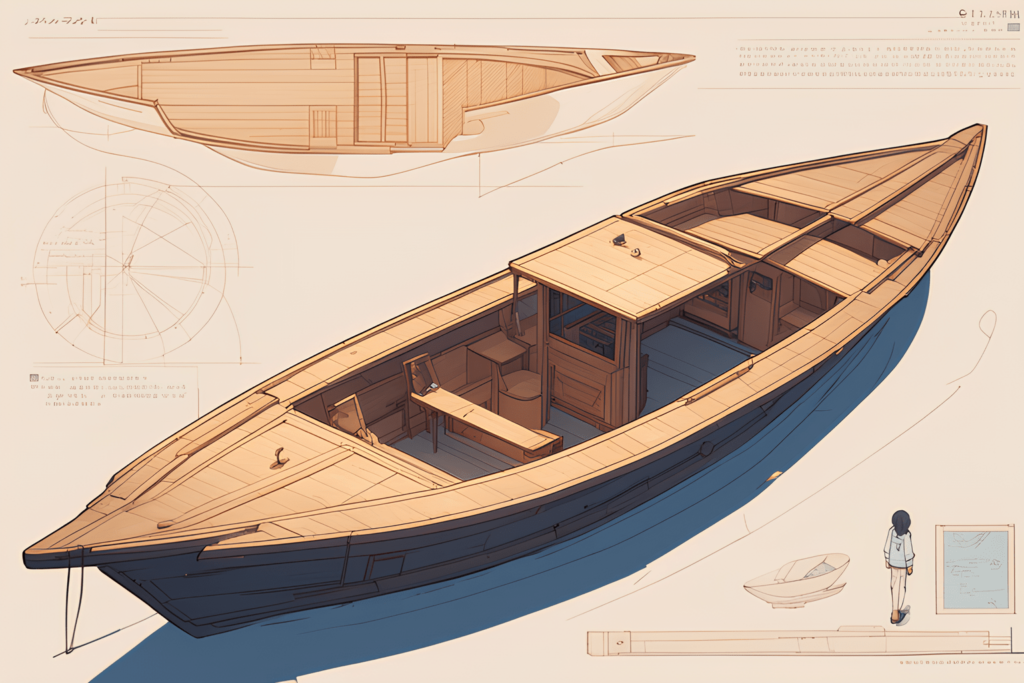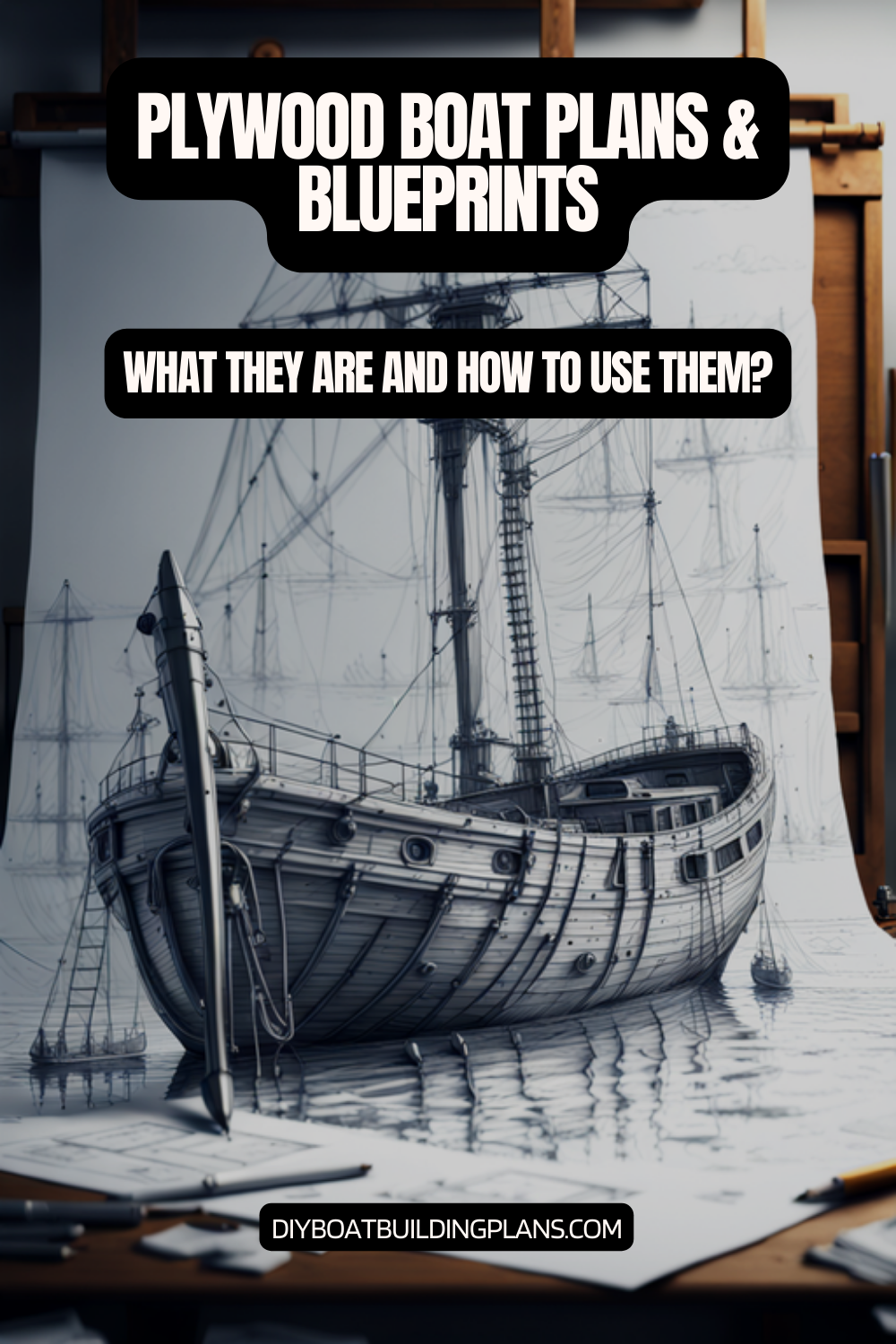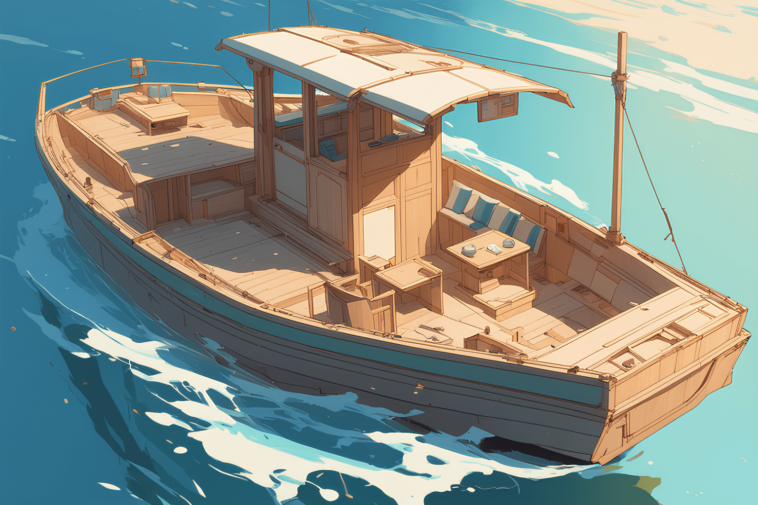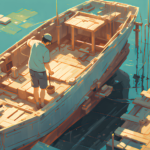Ever thought about building your own boat? It’s possible to make a boat with simple plywood and basic tools. DIY plywood boat plans let amateur builders create their own custom watercraft.
Building a wooden boat is more than a hobby; it’s an art. It mixes creativity, precision, and practical skills. You can make everything from small canoes to big riverboats with DIY plans.
Today’s boat builders can turn plywood into amazing boats. They use special cutting, measuring, and sealing techniques. Plans cost from $24 to $190, fitting all budgets and skill levels.
Key Takeaways
- DIY plywood boat plans are accessible to amateur boatbuilders
- Boat sizes range from 8 to 35 feet in length
- Cost-effective options available starting at $24
- Basic tools and plywood can create custom watercraft
- Variety of boat types including canoes, sailboats, and paddleboards

Why Choose Plywood for Your Boat Project?
DIY boating projects have changed how people build boats. Plywood designs make it easy for both new and experienced builders to create their dream boats.
Choosing the right material is key for a successful boat. Plywood is a top pick for DIY builders because of its special qualities and benefits.
Benefits of Using Plywood
- Lightweight and strong construction
- Easy to shape and manipulate
- Versatile for multiple boat designs
- Affordable compared to traditional boat-building materials
Durability and Longevity
With marine-grade epoxy, plywood boats can handle tough water. Experts say well-kept plywood boats can last many years.
| Construction Method | Durability Rating | Estimated Lifespan |
|---|---|---|
| Stitch and Glue | High | 15-20 years |
| Strip Planked | Medium-High | 10-15 years |
| Skin on Frame | Medium | 5-10 years |
Cost-Effectiveness
Plywood designs are a budget-friendly way to build a boat. Plans cost from $29.99 to $79.99, making it affordable for all.
The true value of a plywood boat lies not just in its cost, but in the personal satisfaction of creating something with your own hands.
Building a plywood boat needs careful planning. You must think about your skill level, how you’ll use the boat, and your workspace. Beginners can start with simple designs and move to more complex ones as they gain experience.
Essential Tools for Building a Plywood Boat
Starting a boat building project needs careful planning and the right tools. Whether you’re using boat plan downloads or small craft plans, the right equipment is key to success.
Boatbuilding doesn’t need a huge tool collection. But, choosing quality tools can greatly improve your project’s results. Professional designers often suggest a specific toolkit for amateur builders.
Essential Cutting and Measuring Tools
- Japanese crosscut saw for precise cuts
- Jig saw for cutting curved plywood sections
- Measuring tape and compass
- Quality squares and rulers
- Random orbital sander
Additional Woodworking Tools
| Tool Category | Recommended Items |
|---|---|
| Cutting Tools | Chisels, hand planes, utility knives |
| Fastening Tools | Power drill, screwdrivers, hammers |
| Holding Tools | Multiple clamps (various sizes) |
Critical Safety Equipment
Safety is vital when working on boat plans. Protect yourself with:
- Safety glasses
- Dust mask
- Work gloves
- Ear protection
“In boatbuilding, your tools are an investment in quality and precision.” – Experienced Boat Builder
Pro Tip: Invest in high-quality tools. While they might cost more initially, they’ll provide better performance and longevity in your boat building journey.
Types of DIY Plywood Boat Plans Available
Exploring plywood boat kits opens a world of exciting maritime possibilities for DIY enthusiasts. With 719 different designs, builders can find the perfect wooden boat blueprints. These match their skill level and water adventures.
The diversity of plywood boat plans is truly remarkable. Builders can choose from multiple design types. These cater to different needs and water environments.
Flat-Bottom Boats
Flat-bottom boats are a great starting point for novice boat builders. These designs offer:
- Exceptional stability
- Simple construction process
- Ideal for calm waters like lakes and rivers
- Excellent for beginners learning wooden boat blueprints
V-Hull Boats
V-hull designs provide superior performance for more challenging water conditions. Plywood boat kits with V-hull configurations deliver:
- Better wave-cutting capabilities
- Improved maneuverability
- Enhanced speed
- Suitable for coastal and rougher water environments
Specialty Boats
For adventurers seeking unique watercraft, specialty boats like canoes and kayaks offer exciting possibilities. These designs include:
| Boat Type | Key Characteristics | Skill Level |
|---|---|---|
| Canoe | Versatile, traditional design | Intermediate |
| Kayak | Compact, maneuverable | Beginner to Advanced |
| Rowing Boat | Excellent for exercise | Intermediate |
“The beauty of DIY wooden boat blueprints is that they offer something for every skill level and passion.” – Experienced Boat Builder
Each boat design presents unique challenges and rewards for passionate builders. They are willing to invest time and creativity into their maritime project.
Unlock the secrets to building your dream boat with MyBoatPlans! With detailed plans for over 518 boats and expert video tutorials, you’ll have everything you need to create your perfect vessel. Click here to begin your journey!”
Understanding Boat Building Terminology
Starting a boatbuilding project needs more than just excitement. You must know the special terms used. Learning these words can make a hard project a success.
Knowing boat construction language helps DIY fans read plans right. It also lets them talk well with skilled builders.
Essential Boat Building Terms Every Amateur Should Know
- Lofting: The process of drawing full-size boat plans to scale
- Framing: Creating the boat’s skeletal structure
- Cold-Molded: A layered plywood construction technique
- Stitch-N-Glue: A modern boatbuilding method using wire stitches and epoxy
Critical Terminology for Successful Construction
| Term | Definition | Importance in Boatbuilding |
|---|---|---|
| Keel | Centerline backbone of the boat | Provides structural integrity |
| Chine | Sharp angle where hull panels meet | Determines boat’s stability and performance |
| Transom | Flat surface at boat’s stern | Supports engine and defines hull shape |
“In boat building, understanding terminology is as critical as knowing how to use your tools.” – Professional Boat Builder
Spending time learning these terms will boost your boatbuilding skills and confidence. Each word is key to boat design and building.
Preparing Your Workspace for Boat Construction
Creating the right environment for wooden boat construction is key to your DIY Plywood Boat Plans & Blueprints project’s success. A well-organized and safe workspace can turn a frustrating experience into a fun boat-building journey.
Creating a Safe Environment
Safety is the most important thing when setting up a workspace for boat building. The right preparation can prevent accidents and make the construction process smooth.
- Install adequate ventilation to manage epoxy and paint fumes
- Wear protective gear including safety glasses and respirator
- Keep a fire extinguisher nearby
- Ensure proper lighting for precise measurements
“A well-prepared workspace is the foundation of successful boat construction.” – Experienced Boat Builder
Essential Workspace Setup Tips
For successful wooden boat construction, your workspace needs strategic organization and the right equipment.
- Select a spacious, dry area with minimal temperature fluctuations
- Invest in a sturdy workbench at a comfortable height
- Create dedicated zones for different construction stages
- Organize tools and materials for easy access
With over 500 DIY Plywood Boat Plans & Blueprints available, choosing the right workspace is vital for your boat-building success. Careful preparation sets the stage for an enjoyable and rewarding project.
Step-by-Step Guide to Building a Plywood Boat
Starting a DIY boating project needs careful planning and precise steps. Plywood boat designs require attention to detail. This ensures a successful build.
Building a plywood boat involves several key stages. These stages turn raw materials into a seaworthy vessel. Both professional boat builders and enthusiasts agree on the importance of precision in DIY projects.
Starting with the Frame
The foundation of a plywood boat is its solid frame. Here are the essential steps:
Download over 500 Boat Plans. Click on the link below.
-->Click Here<--
- Select high-quality marine-grade plywood (48×96″ sheets)
- Measure and cut plywood precisely
- Leave approximately 1/4″ space between parts
- Use waterproof adhesive and marine-grade screws
Adding the Hull and Deck
Building the hull needs careful technique and patience. Plywood boat designs require specific skills:
- Bend plywood sheets using specialized techniques
- Apply kerf cutting for curved sections
- Seal joints with marine-grade epoxy
- Ensure watertight connections
“The art of boat building lies in the details.” – Glen L. Witt, Naval Architect
Finishing Touches and Painting
The final stage turns your project into a professional-looking watercraft:
| Task | Materials | Time Required |
|---|---|---|
| Sanding | Marine sandpaper | 2-3 hours |
| Priming | Marine-grade primer | 1-2 hours |
| Painting | Marine enamel paint | 3-4 hours |
Pro tip: Take your time with finishing touches. This will help create a professional-looking plywood boat that will last for years.
Maintenance Tips for Your Plywood Boat
Keeping your DIY boating project in top shape needs careful attention. Wooden boats need regular upkeep to last long and perform well. With the right care, you can keep your boat in great shape and enjoy many hours on the water.
Routine Checks and Care
Maintaining a plywood boat involves several key steps:
- Inspect the boat’s surface weekly for any signs of damage
- Clean the boat thoroughly after each use (1-2 hours per week)
- Polish wooden surfaces monthly (2-3 hours recommended)
- Check for water penetration and possible rot spots
“A well-maintained boat is a safe and reliable companion on your maritime adventures.”
Long-Term Storage Solutions
Proper storage is key to protecting your wooden boat. Here are some important storage tips:
- Store in a dry, covered area away from direct sunlight
- Use protective covers to prevent moisture buildup
- Elevate the boat to avoid ground contact
- Winterize the boat during cold seasons
Pro tip: Regular maintenance can greatly extend your DIY boating project’s lifespan, with some boats lasting decades with proper care.
By spending time on routine checks and smart storage, your plywood boat will stay in excellent condition. This way, you can enjoy many years of maritime fun.
Where to Find Quality Plywood Boat Plans
Finding the right wooden boat blueprints can make your DIY boat-building journey exciting. Whether you’re new or have experience, getting reliable boat plans is key to success.
Looking for boat plans can be a challenge. But, there are many places to find high-quality wooden boat blueprints.
Top Online Resources for Boat Plans
- Glen-L Marine Designs: Offers detailed digital boat plan downloads
- Woodworking websites with specialized marine blueprints
- Professional boat design platforms with instant PDF downloads
- Specialized maritime craft forums with shared resources
Recommended Books and Publications
Print resources are also great for wooden boat blueprints. Here are some top publications:
- “Boatbuilding with Plywood” by Glen L. Witt – A classic reference
- Small Craft Advisor magazine
- Professional Boat Builder magazine
- WoodenBoat Magazine – Has extensive plan collections
“The right boat plan is your blueprint to maritime adventure.” – Anonymous Boat Builder
When choosing boat plan downloads, look for detailed instructions and clear measurements. Make sure they match your skill level. Good wooden boat blueprints offer all the guidance you need for a successful build.

Community and Support for DIY Boat Builders
Building a boat by yourself can seem lonely, but there’s a lot of help out there. Online forums and social media groups are full of resources for boat lovers. Places like WoodenBoat Forum and Facebook groups for boat building are great for sharing tips and solving problems.
Local boat clubs make building a boat a team effort. Workshops with experienced builders teach new skills. These events are where you can learn from the best and show off your work.
Forums and Online Communities
The internet has changed how we share boat-building knowledge. Sites like Glen-L Marine and Boat Design forums are full of discussions. You can learn from experts like Sam Devlin and William Atkin’s followers, saving you years of trial and error.
Local Clubs and Workshops
Boat building clubs in your area offer hands-on learning. These groups keep traditional boat-making alive. By joining workshops, you can learn, make friends, and turn your project into a community effort.
FAQ
What type of plywood is best for boat building?
Marine-grade plywood is the best for boats. Look for exterior-grade with waterproof glue and few voids. Okoume or meranti wood is great for its durability and lightness.
How much does it cost to build a DIY plywood boat?
Costs vary by boat size and design. But, most can build a small to medium boat for $500 to $3,000. This includes plywood, epoxy, fiberglass, and tools.
Do I need advanced woodworking skills to build a plywood boat?
No, you don’t need to be a pro. Many plans are for beginners. The Stitch-N-Glue method makes it easy. Start with simple designs and get better as you go.
What tools are essential for plywood boat construction?
You’ll need a circular saw, drill, and nail gun. Also, a sander, measuring tape, and level. Safety gear like eyewear and gloves is a must. Special tools like clamps and epoxy spreaders are also needed.
How long does it take to build a plywood boat?
Time depends on the boat’s complexity and your skill. A simple 14-foot boat might take 100-200 hours. More complex boats can take months or a year.
How do I waterproof my plywood boat?
Use epoxy resin to waterproof. Apply several coats of marine-grade epoxy. Then, add fiberglass cloth for extra strength. Finish with marine-grade paint or varnish for UV protection.
Where can I find reliable plywood boat plans?
Check out Glen-L Marine Designs and boat building magazines. Books like “Boatbuilding with Plywood” by Glen L. Witt are also great. Online platforms and forums have PDF plans for all skill levels.
Is a plywood boat durable compared to other boat materials?
Yes, a well-made plywood boat is durable and long-lasting. Use marine-grade plywood, epoxy, and maintain it well. With care, a plywood boat can last 10-20 years.



